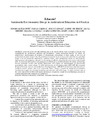Identificador persistente para citar o vincular este elemento:
https://accedacris.ulpgc.es/jspui/handle/10553/77994
| Campo DC | Valor | idioma |
|---|---|---|
| dc.contributor.author | Altomonte, Sergio | en_US |
| dc.contributor.author | Cadima, Paula | en_US |
| dc.contributor.author | Yannas, Simos | en_US |
| dc.contributor.author | De Herde, André | en_US |
| dc.contributor.author | Riemer, Hana | en_US |
| dc.contributor.author | Cangelli, Eliana | en_US |
| dc.contributor.author | López de Asiain Alberich, María | en_US |
| dc.contributor.author | Horvath, Sara | en_US |
| dc.date.accessioned | 2021-03-09T10:25:37Z | - |
| dc.date.available | 2021-03-09T10:25:37Z | - |
| dc.date.issued | 2012 | en_US |
| dc.identifier.isbn | 978-612405789-2 | en_US |
| dc.identifier.uri | https://accedacris.ulpgc.es/handle/10553/77994 | - |
| dc.description.abstract | Awareness of the role that buildings play in the current climate crisis is bringing to the fore new responsibilities for architectural educators and practitioners. Various pedagogical barriers still hinder the comprehensive implementation of mandates of environmental sustainability in design studio, at all levels of architectural education. Concurrently, the promotion of sustainable design in the practice of architecture and urban design is not yet consistently supported by regulatory bodies, whose qualification criteria are still frequently inhomogeneous and ambiguous, especially in ascertaining an effective integration between creative and technical skills. A substantial shift in policies and pedagogical methodologies is needed to facilitate the transfer of knowledge between sustainable sciences and building applications, and enhance the implementation of environmental sustainability within creative design. To tackle such barriers, the EU-funded project EDUCATE (Environmental Design in University Curricula and Architectural Training in Europe, 2009-2012) was built on a consortium of seven European academic partners and several professional bodies, aiming to promote the integration of sustainable environmental design in the education and practice of architecture and urban design. This paper illustrates some of the results obtained by the EDUCATE project and discusses the potential transfer of its methodologies and tools to academic and professional institutions at a global level. | en_US |
| dc.language | spa | en_US |
| dc.publisher | Pontificia Universidad Católica del Perú | en_US |
| dc.source | Proceedings - 28th International PLEA Conference on Sustainable Architecture + Urban Design: Opportunities, Limits and Needs - Towards an Environmentally Responsible Architecture | en_US |
| dc.subject | 58 Pedagogía | en_US |
| dc.subject | 3305 Tecnología de la construcción | en_US |
| dc.subject.other | Education | en_US |
| dc.subject.other | Sustainability | en_US |
| dc.subject.other | Architecture | en_US |
| dc.subject.other | Curriculum | en_US |
| dc.subject.other | Knowledge transfer | en_US |
| dc.title | Educate! sustainable environmental design in architectural education and practice | en_US |
| dc.type | info:eu-repo/semantics/conferenceobject | en_US |
| dc.type | ConferenceObject | en_US |
| dc.relation.conference | XVIII International PLEA Conference - PLEA 2012 | en_US |
| dc.investigacion | Ingeniería y Arquitectura | en_US |
| dc.type2 | Actas de congresos | en_US |
| dc.description.numberofpages | 8 | en_US |
| dc.utils.revision | Sí | en_US |
| dc.identifier.ulpgc | No | en_US |
| dc.contributor.buulpgc | BU-ARQ | en_US |
| item.fulltext | Con texto completo | - |
| item.grantfulltext | open | - |
| crisitem.event.eventsstartdate | 07-11-2012 | - |
| crisitem.event.eventsenddate | 09-11-2012 | - |
| crisitem.author.dept | Departamento de Arte, Ciudad y Territorio | - |
| crisitem.author.orcid | 0000-0001-9422-394X | - |
| crisitem.author.fullName | López De Asiain Alberich, María | - |
| Colección: | Actas de congresos | |
Visitas
299
actualizado el 30-nov-2024
Descargas
169
actualizado el 30-nov-2024
Google ScholarTM
Verifica
Altmetric
Comparte
Exporta metadatos
Los elementos en ULPGC accedaCRIS están protegidos por derechos de autor con todos los derechos reservados, a menos que se indique lo contrario.
